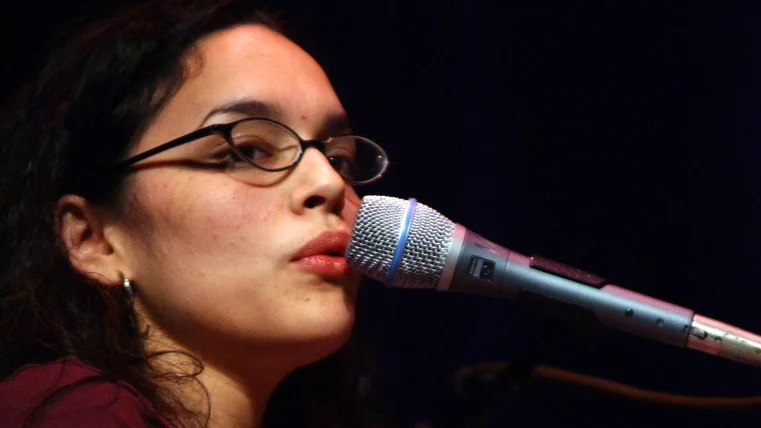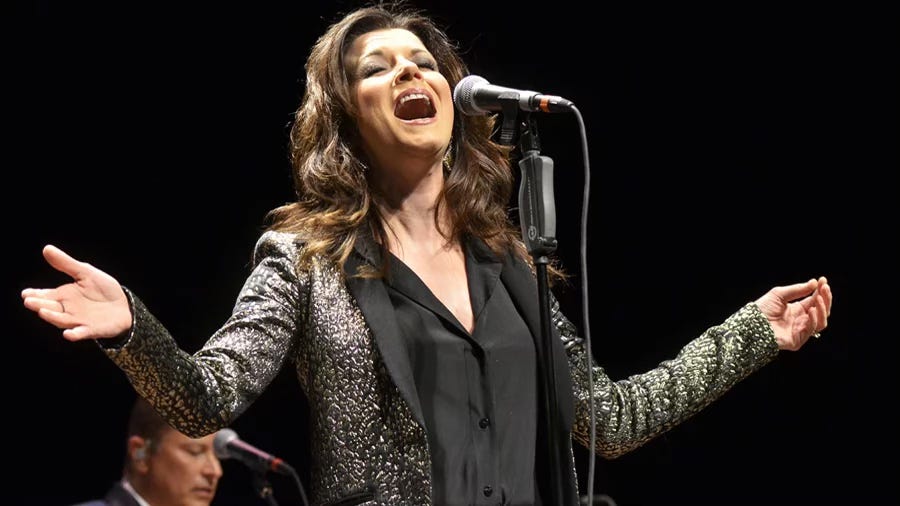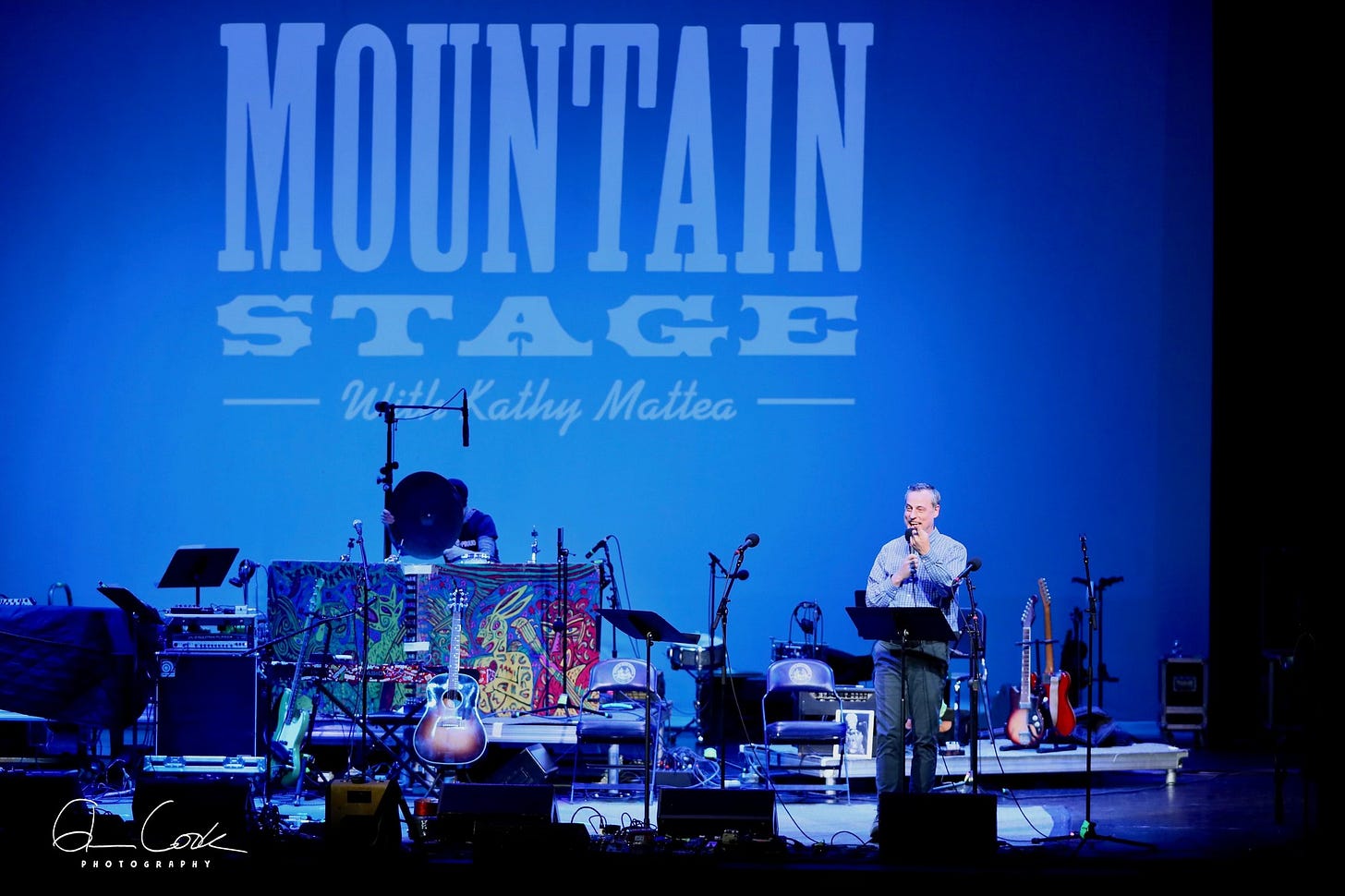Mountain Stage: An Oral History
Part 3 — The challenge of booking and taping 24 two-hour radio shows each year
Developing, booking talent, and taping at least 24 live shows a year — on a public radio budget, no less — presents a series of logistical and financial challenges. Yet, somehow, Mountain Stage has managed to make it work for more than 40 years.
For the third installment of this four-part oral history of the National Public Radio show, I spoke with people behind the scenes about those challenges. They also talk about artists they’ve met over past four decades.
Here is what they had to say:
Adam Harris (executive producer since 2011): We book a month’s worth of shows into a night. Sometimes we’ll have five bands in a night. Certainly, there’s no shortage of talent for us to choose from, but it can be tough at times to coordinate.
Larry Groce (co-founder, artistic director and host until 2021): We like to book people on the show who we could have again in 10 years and again in 20 years because they're still good. If somebody's really good, they will still be good even though they may not be as popular at the moment. Many people have been on since the late 1980s and they continue to come on until they pass away. I have no problem with that because they're good.
Bob Thompson (house pianist): People that are classics from the past, people who are up and coming. You get to hear them all. I remember Norah Jones was on this show with her first record (“Come Away With Me”). She was nervous and talking to me on the side of the stage. I was like, “Yeah, good luck with your CD.” Two weeks later, it was all I heard everywhere I went.
Ron Sowell (music director): I was here the first time Mary Chapin-Carpenter played this show. I watched Lyle Lovett play on this show. I’ve met people who were legends and now are on the downside of their career. You see people on the way up, on the way down, and everywhere in between. When you think about it, it’s pretty surreal.
Groce: We don't want to be limited by categories. We don't just book a single category. The majority of people are in the Americana genre, but there's several flavors of that. There's a difference between a blues singer and a bluegrass player, but they're all Americana according to the charts and stuff. We've always done that, though. We've always had that. We also have all the indie pop and alt-rock and world music and traditional music. We want to look for originality that will last.
Sowell: I get to hear stuff from all over the world — Africa, South America, Portugal, Ireland. Lots of world music, blues, and jazz. People doing some really off the wall stuff. I’m continually inspired and awed by what I hear.
Mountain Stage: An Oral History
With a population of just over 46,000, Charleston is West Virginia’s largest city and home to the state capital. A manufacturing hub in the middle of what was once —and to a degree still is — coal country, it also is where three major interstate systems (I-64, I-77, and I-79) converge.
As the artistic director working with a very limited budget, Groce developed a simple “egalitarian” format that still exists. Headliners get 20 to 25 minutes; the others, depending on how many are booked get 15 to 20.
Groce: The only way you can do the show is for people to share the bass rig and share the drum rig and come whenever we say. The most famous act on the show gets the same hotel room as the unknown act, and they get the same catering as the unknown act. They get the same dressing room as the unknown act. Often, the headliner has to come in earlier for soundcheck because we do it in reverse order. What surprises me is that people will do it our way.
Andy Ridenour (co-founder and executive producer until 2011): I think, especially when a larger act is involved, it’s because we give them an audience they want and are trying to reach. They know we keep it simple and about the music, and there’s a place for that.
Groce: In 40 years we've never told anybody what to sing or what not to sing. Never. We say, "You have this amount of time. You do what you want." We never said, "You have a hit song. You got to do that song." I don't care if you do that song or not. That's the other shows. Also, nobody only gets one song on this show. If you have a 16-minute, 18-minute song, you can do that, but we give you enough time to do usually three to four songs. We're never going to treat people like they're openers. Everybody's going to be treated the same.
The Martina McBride Experience
To illustrate his point, Groce launches into a story about Martina McBride, who first played on the show in 2006. At the time, McBride was in the middle of a 12-year run as the most played female vocalist on country radio. She had just recorded a traditional country album featuring songs by Lefty Frizell and Hank Williams, and knowing she would not get much airplay, her publicist asked if she could appear on the show.
Groce: I told Andy, "Why does she want to be on the show? She could buy the show." In one night, she was grossing about half of our budget for the year. We wouldn't go after her. That'd be silly and a waste of time. For one reason, artists of her popularity have no reason to do our show. For the other reason, it doesn't fit our format exactly unless you want to come on and do it our way, but she said, “However you do it, that's what we'll do." R.E.M. did that, too.
Mountain Stage: An Oral History
No story about National Public Radio’s “Mountain Stage” is complete without talking about the day R.E.M. — at that point the most popular band in America — performed in tiny Charleston, W.Va. “That was the show,” co-founder and longtime host Larry Groce says of the band’s April 28, 1991 …
The show was moved to a 1,600-seat auditorium, Groce says, because of McBride’s popularity and the previous experience with R.E.M. When the singer arrived, she surprised Groce by asking him what he wanted her to sing on the show.
Groce: I said, "I don't care what you sing on the show." I think she's never been told that before. Obviously, in her own concerts, she does what she wants, but she knows the audience demands to hear certain things. I said, "You can play what you and your dad sang when you were in your bedroom when you were a little kid," because they had a family band. “If you sang Red River Valley, and you want to sing that, sing it."
McBride asked again about other songs and was told she could do whatever she wanted. The only requirement, Groce recalled, was that she perform at least 30 minutes. After playing for more than an hour, McBride ended the show with a statement that Groce says should be “put up on the wall somewhere.”
Groce: She said, "I want you to know this is a radio show like no other. They want you to play the music that you love." There you go. That's it in a nutshell. She said it. That's what we want and that’s what she did. After she said that, she said, "So I'm going to play you a song that I put out as a single and it was a failure, but I really love this song." And she played it.
In 2014, McBride returned to Mountain Stage during one of its many road trips, performing R&B covers during a show in Bristol, Tenn.
Taping the Show
Harris: Usually, we tape a show one to three months before it airs. Sometimes we can turn it around in a month, and it’s usually not more than three months, but there are so many factors. Now that we’re working with Kathy (Mattea’s) schedule, we have to look out further than we did with Larry, but sometimes you’ll only have two weeks to edit, which is still amazing to me. The logistics of doing that are so complex I can’t wrap my head around it.
Groce: For the first 12 years, we went live actually on the air. Then it got to be too complicated to get people in here because we were doing the show at 3 p.m. and getting someone to do a soundcheck at 9 a.m. was just impossible. I don't even know how we did it for that long, but a lot of people did. REM was on at that time live. They didn't soundcheck at 9, but they were there early.
Thompson: Every Sunday we come in here you never know what a show is going to be like. That’s part of the fun. When we do the finale at the end of the show, everyone is on stage together. It’s the musical end to the show, but it’s also the culminiaton of the whole day. We hang out and get to know each other, see people we’ve been fans of or meet new people. And we all get to make music together. It’s more than a show then.
Harris: Taping the shows on Sundays has worked out for us for many years. For a lot of bands, Sunday is a travel day, and we have a number of markets —Cincinnati, Cleveland, Louisville, Pittsburgh, even Atlanta — that are within a day’s drive.
Sowell: We work really hard. Last week we played two full sets, but today is a real relaxed day. No matter what we’re doing, we’re having fun with each other. We create a warm welcoming place where our guests can relax and give their best performance.
Thompson: All of the people here have worked together for so long. We’re like a family. It’s caused me to grow in my style. I get to play sometimes with jazz artists, and that’s a great musical experience. The show also travels as well, and that’s always fun. We have a good time.
Groce: Having that family feel is big for us. We're really not interested in trends. We're not interested in being the hippest show around. Think about where we come from, this state. West Virginia has a certain personality that's old, it's consistent, and it is person to person. In music cities — Austin, Nashville, New York, L.A., wherever it happens to be “in” at the moment — somebody's shaking your hand and looking over your shoulder to see who else is more important than you. That's not what we do. We don't need to do that. When (performers) come, we're grateful that they're here.
Coming next Wednesday: Changes, transitions, a new host, and a legacy
To read the rest of this series, click on the links below:








Wait, what was the song Martina sang?
The Martina McBride story is great (and makes me think of the story behind Rosanne Cash's album _The List_).